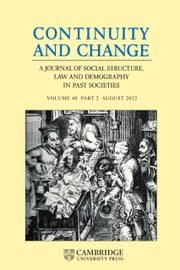Article contents
Landholdings and the family life cycle in traditional Japan
Published online by Cambridge University Press: 01 May 2000
Abstract
This article examines, on the basis of landholding patterns, the relationship between the peasant family economy and its family life cycle in the latter half of the Tokugawa era (1603–1867). The analysis is focused on the life-cycle patterns of the stem family. In such a system, the continuation of the family and its assets assumed prime importance while hired labour did not provide a substantial proportion of the workforce on the farm. In fact, the stem family was officially recognized as the lawful family form by the Meiji government, but even in earlier periods the stem family system provided the dominant form. Among the samurai it was always the required form. Among the peasantry, by the early eighteenth century the stem family was the predominant family system.
The family system observed here differs in structure from that found in western-European family systems. Even when developmental aspects of European households are discussed, it is the relationship between the simple, nuclear family forms and their economic and social correlates – especially poverty, inheritance and landholdings – that is analysed. How Japanese stem family households operated with respect to landholding and other variables is the main theme of this article. The data come from an agrarian and considerably backward area of north-east Japan where harvest failures were not infrequent even in the late eighteenth and early nineteenth centuries.
- Type
- Research Article
- Information
- Copyright
- © 2000 Cambridge University Press
- 2
- Cited by




